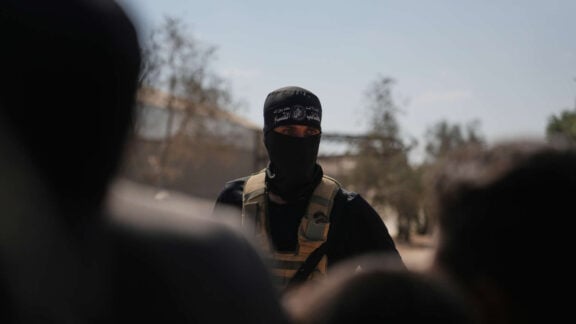On 31 October,1864 the SS Egmont entered Port Phillip Bay. Amongst the passengers who disembarked at Melbourne, according to the official incoming passenger list, was Lambros P. Indares, noted on the list as a foreigner (Greek) whose profession was that of a ‘Gentleman’.
Although the name Indares does not appear in any of the textbooks dedicated to the articulation of our history as Greek settlers in Australia, his legacy is a testament to the social & cultural contribution of those early Greek settlers who have proceeded us. Suffice to say, that Lambros Panagiotis Indares, whilst a resident of the newly established Colony of Victoria, in 1867, wrote a series of four (4) letters to the Editor of the then Argus newspaper articulating in an intimate and concise manner, the events surrounding the revolt of the Cretan population against the Ottoman Empire and the political maneuvering of the then Great Powers.
These letters to The Argus newspaper are most likely the first ever written by a Greek immigrant, in the English language, to an Australian newspaper. Indares’ letters resonate the passion of an individual whose ancestry, activities, interactions and political views should be preserved and acknowledged as part of our Greek Australian historical narrative.
The Argus – article on the Cretan revolt 19 March, 1867
Under the title “A letter from home”, the London correspondent for The Argus reported on the Cretan rebellion against the Ottoman forces by proclaiming in the opening paragraph that “the insurrection in Crete – is now confidently believed to be the work of Russian agents – drags its slow length along an extraordinary fashion”. The journalists’ commentary continues in a patronizing tone remarking that “Turk and Greek are pitted against each other in the fabrication of impossible victories; and in this kind of contest I am bound to admit that the sons of Hellas retain their old prestige for superior lying”.
In a dismissive manner the newspaper article assures its readers that the Great Powers would not use Crete as a pretext to pre-occupy themselves with the ‘Sick Man’s state’. This was a clear inference to the decrepit state of the Ottoman Empire at that time and the difference of opinion which existed between the British and the Russian empires on how to deal with the ‘ill state’ of the Ottoman Empire.
READ MORE: Rewriting the history of Hellenism in Australia
Letter of response by L.P. Indares to the Editor of Argus – 21 March, 1867
Almost immediately Lambros Indares responds to the article published in The Argus the previous day. Indares’ first letter to the Editor, suggests that he was a person who possessed an excellent command of the English language and was well versed in British etiquette and protocol.
Indares’ courteous opening sentence “Sir, – If I am not trespassing on the columns of your valuable journal, may I ask you for the insertion of this, in reference to ‘A Letter from Home’ is directly followed by a plea to the reader’s impartiality.”
He refers to heroic efforts of the Cretan population against the oppressors to attain their liberty and accentuates the military inequities between the two forces.
Indares informs The Argus readers of the “heroic blowing up of the Monastery of Arcadi” that took place in August 1866 and the sacrifice of those Cretans who defended the sacred site. He describes those who occupied the Monastery “as people of all classes and ages” motivated by their determination to gain liberty and independence.
The letter concludes with Indares declaring his Greek nationality, and appropriately observes that irrespective of the geographical region that a Greek may belong to their sole objective is “sacred liberty, and not to suit any other nation’s political views”. Indares’ first letter is a condemnation of the foreign policies of the Great Powers and their failure to provide a resolution to the “Cretan problem”.

The Argus article on the Cretan question – 10 June, 1867
Under the heading “The arrival of the English mail”, the Cretan question once again becomes the subject of debate. The journalist comments on the political turmoil in Europe and reverts to the Eastern question and by extension to the Cretan rebellion.
The report from the beginning is dismissive of the Cretan uprising. Its author assumes that the prevailing tensions in the region and the restlessness amongst the population are a result of the Sultan’s lethargy. The journalist notes however that the Sultan has woken “from his lethargy” and has sent “the most experienced officer in the Turkish service to command the forces engaged in the subjugation of Crete” that officer being Omar Pasha.
In his closing remarks, the author declares that the uprising of “the islanders will be suppressed before any foreign power can have the opportunity to discover in progress of events a decent excuse for interference.”
READ MORE: Early Greek settlers: The two Greek pioneers of cinema and their beloved Joy-Ark
Letter of response by L.P. Indares to the Editor of Argus – 11 June, 1867
In his second letter Indares remarks on the passing reference made in “The Argus” in which it was alluded that the commanding forces of Omar Pasha will put a stop to the uprising of the island’s inhabitants before any intervention by any foreign powers.
His observations on the appointment of Omar Pasha, as the chief of the Turkish forces in Crete, are proof of his intimate knowledge of the history of the island. They also substantiate his understanding of the military hierarchy who were in commanded of the Turkish troops. He correctly points out that the previous chief of the Turkish forces in Crete Mustapha Pasha, a native of Crete with an extensive knowledge of the island’s topography, failed to meet any success despite the aid of thousands of “well-disciplined soldiers” under his command.
Based on this assessment, Indares casts doubt on the ability of the newly appointed chief of the Turkish troops Omar Pasha – an ethnic Serb – to succeed due to his limited knowledge of the island’s terrain and its inhabitants. Indares concludes that ultimately “the long-suffering land of Minos will breathe the air of liberty once more” even “if diplomatic intrigue will not interfere”.

Letter by L.P. Indares to the Editor of The Argus – 19 August, 1867
Indares’ third letter to the The Argus was signed under the pseudonym “Philhellenist”. The letter is an appeal to the reader’s “philanthropy” for the purpose of seeking empathy from the local population and furthermore it is a calling for the formation of a ‘philhellenic committee’ in Australia.
Indares was acquainted with the fact that committees of support were established in many countries throughout the world. Indares, in an emotional plea, endeavours to persuade the local population to form a committee of support.
The use of the power of the press to convey his message of the atrocities committed in Crete and the endeavours of the Cretan population to seek liberty at any cost resonate throughout Indares’ letter.
Indares writes: “It is the case of an injured and oppressed people struggling to regain their freedom; it is the cause of right against might, it is the war of truth against error, it is a contest between civilisation and semi barbarism; it is, in a word and the broadest and fullest sense of that word, the battle of liberty.”
READ MORE: Early Greek Settlers: The first Greek-Orthodox wedding in Australia in 1898

Indares’ call for support to establish a Philhellenic Committee in Australia may well have been motivated by an extensive article that appeared in The Argus on 17 June, 1867, published a week after Indares’ second letter. The article provides a critical analysis of the Cretan question and role of the Western Powers. It praises the “heroic sacrifices of the Candiotes” and calls for the “cessation by Turkey of the island of Candia to the Kingdom”. This most likely is the first time that favourable article in support of the Cretan plight appeared in an Australian newspaper.
Whether or not Indares’ plea to the Argus readers managed to gain the sympathy from the local population will become soon apparent in his final letter to the The Argus.
Indares’ Letter to the editor of The Argus – 7 October 1867
Indares’ final letter to the Editor of The Argus strongly reflects his disappointment in the Australian public’s lack of interest to take any decisive stance on the Cretan question. His call to establish a committee of support, from all indications failed to gather any support. His opening remarks clearly indicate the futility that overwhelmed Indares, “in reference to the unhappy condition of Crete, although of little or no interest at all to this distant country…”
He continues by referring to inherit injustices that were occurring on the island of Crete and remarks that the “Turkish news with respect to the subjugation of Crete always proves to be based on falsehood…with a premeditated intention of cooling diplomacy with regard to the Cretan question.”
His analysis also provides an insight as to the composition of the Turkish armed forces, which consisted of “many renegade officers” who rejected Christianity to follow the “banners of Mahomet for military honours”. Indares’ observation is a direct reference in all probability to Omar Pasha, a Christian Serbian who converted to Islam and succeeded Mustafa as the leader of the Ottoman military forces in Crete.
In his final endeavour to persuade the readers of the injustices that were occurring in Crete, Indares shifts his argument to the principles of Christianity and to those nations espousing Christian values by asserting that “the actual passivity of the great Christian powers with regard to the present condition of Cretan affairs seems quite contrary to the political principles of the century we are in”.
In the departing line of his letter Indares inserts an old Greek proverb: “The wolf may change her hair, but she will never change her ferocity” adding claim to his creed that the oppressing Turkish forces will not change their intentions and will continue to suppress any calls for the independence of Crete by its inhabitants.

Paradoxically, just five days after Indares’ last letter to The Argus a lengthy article appeared in the Melbourne based newspaper the Australasian on 12 October 1867, in which the author surmises “The Turks are not able to control the island, and its retention does not strengthen the Porte. But it is apprehended that the fulfilment of the wishes of the insurgents would embolden other Greek provinces to follow the example, and it is the danger thereby to the Ottoman empire”. One can only speculate whether Indares’ letters to “The Argus” played an integral role in this instance.
Indares acknowledges the importance of media and with his four passionate letters the Cretan question enters the public fora, challenging the prevailing colonial ideology and simultaneously seeking empathy for the Cretan cause from the Australian public.
In an era in which Colonial rhetoric predominates Indares can be portrayed as an individual who persistently challenges the prevailing narrative on the events that were taking place in Crete with an authoritative manner.
READ MORE: Early Greek Settlers: Pandemic, racism and the Greeks of Port Pirie in 1919
Lambros Indares’ residency in Melbourne
During his residency in Melbourne, Indares became a partner at the Victorian Wine Vaults-wine merchants-located at 231 Bourke St, East Melbourne.
The partnership however was short-lived and the joint venture was dissolved in August 1868 with Indares retiring from the business. Upon his retirement, and for the next two years, Lambros Indares was the Keeper for the Albion Restaurant located at 101 Elizabeth Street, Melbourne.
After a six-year residency in Australia L. P. Indares continuous his odyssey-perhaps somewhat disappointed-and departs from Sydney on 30 June 1870 aboard the steamer the “City of Melbourne”. The first stop of his journey would be San Francisco and for over a decade Lambros Indares continues his travels to England, Cyprus, finally settling in the City of Patras where he married Exakousti Frangou or Vasileiadi in 1882 from Livartzi Achaia. For the remainder of his life Indares will reside in Patras working as an interpreter for the Port authorities and providing English language tuition to the affluent of students of the city.

Family Ancestry
Lambros Panagiotis Indares was born on 26 March, 1838, at Trieste – a major city and port of the then Austro-Hungarian Empire with a thriving and prosperous Greek diasporic community. His birth coincided with father’s self-imposed exile from Greece from 1835-1843.
Lambros Panagiotis Indares was the grandson of Dimitrakis Indares, born in Livartzi Achaia and one of the first freedom fighters of the 1821 Greek Independence movement who joined and espoused the philosophy of the “Filiki Etaireia” (Society of Friends) in Greece. Dimitrakis Indares was trained by the British in Zakynthos where he received the rank of Chiliarhos, a commander of a thousand soldiers.
The Indares family was commended for their active involvement and bravery during Greece’s war of independence against the Ottoman Empire and on numerous occasions family members were awarded medals for their meritorious efforts.
READ MORE: Antonio Boulizos, the extraordinary journey of Victoria’s first Greek-Australian Police Officer
Epilogue
The surname Indares will once again appear in the Australian Press, this time in 1956 in The Argus and under the title “A Greek Bearing Gifts…”

“Welfare officer Panos Indares, of the migrant ship Cyrenia, has three gifts from the Olympic Committee of Greece for the Olympic Committee of Melbourne. But he doesn’t know what they are. He thinks one is an urn. One is for Melbourne University to be kept as a memento of the 1956 Games.”
Panos Indares, the grandson of L.P. Indares, will remain in Australia for just over a year and thereafter departs for Greece.
Whether or not his grandson Panos was aware of his ancestor’s residency in Melbourne and his Australian legacy will remain unanswered.
Costas Markos is a board member of the Greek Community of Melbourne. Bibliography and references for this article are from 1. Archival newspaper collection -Australia (TROVE); 2. Public Records of Victoria; 3. All correspondence written by L.P. Indares was located at his ancestral home in Livartzi Achaia; 4. Constantinos D. Bitas – Historian – Unpublished memo – Dimitraki Spiliou Indares; 5. Image of L.P. Indares – Indares Family Archives; 6. This article would not be possible without the valuable contribution and guidance of Dimitris Indares, Film Director, and great grandson of L.P. Indares. With thanks to: Kostas A., Kostas K., Nikos P. & Siobhan C.K









